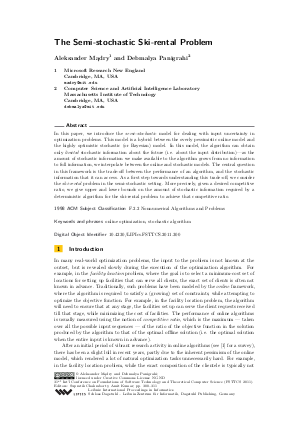The Semi-stochastic Ski-rental Problem
Authors Aleksander Madry, Debmalya Panigrahi
-
Part of:
Volume:
IARCS Annual Conference on Foundations of Software Technology and Theoretical Computer Science (FSTTCS 2011)
Part of: Series: Leibniz International Proceedings in Informatics (LIPIcs)
Part of: Conference: IARCS Annual Conference on Foundations of Software Technology and Theoretical Computer Science (FSTTCS) - License:
 Creative Commons Attribution-NonCommercial-NoDerivs 3.0 Unported license
Creative Commons Attribution-NonCommercial-NoDerivs 3.0 Unported license
- Publication Date: 2011-12-01
File

PDF
LIPIcs.FSTTCS.2011.300.pdf
- Filesize: 455 kB
- 12 pages
Document Identifiers
Subject Classification
Keywords
- online optimization
- stochastic algorithm
Metrics
- Access Statistics
-
Total Accesses (updated on a weekly basis)
0Document
0Metadata
Abstract
In this paper, we introduce the semi-stochastic model for dealing with input uncertainty in optimization problems. This model is a hybrid between the overly pessimistic online model and the highly optimistic stochastic (or Bayesian) model. In this model, the algorithm can obtain only limited stochastic information about the future (i.e. about the input distribution)---as the amount of stochastic information we make available to the algorithm grows from no information to full information, we interpolate between the online and stochastic models. The central question in this framework is the trade-off between the performance of an algorithm, and the stochastic information that it can access. As a first step towards understanding this trade-off, we consider the ski-rental problem in the semi-stochastic setting. More precisely, given a desired competitive ratio, we give upper and lower bounds on the amount of stochastic information required by a deterministic algorithm for the ski-rental problem to achieve that competitive ratio.
Cite As Get BibTex
Aleksander Madry and Debmalya Panigrahi. The Semi-stochastic Ski-rental Problem. In IARCS Annual Conference on Foundations of Software Technology and Theoretical Computer Science (FSTTCS 2011). Leibniz International Proceedings in Informatics (LIPIcs), Volume 13, pp. 300-311, Schloss Dagstuhl – Leibniz-Zentrum für Informatik (2011)
https://doi.org/10.4230/LIPIcs.FSTTCS.2011.300
BibTex
@InProceedings{madry_et_al:LIPIcs.FSTTCS.2011.300,
author = {Madry, Aleksander and Panigrahi, Debmalya},
title = {{The Semi-stochastic Ski-rental Problem}},
booktitle = {IARCS Annual Conference on Foundations of Software Technology and Theoretical Computer Science (FSTTCS 2011)},
pages = {300--311},
series = {Leibniz International Proceedings in Informatics (LIPIcs)},
ISBN = {978-3-939897-34-7},
ISSN = {1868-8969},
year = {2011},
volume = {13},
editor = {Chakraborty, Supratik and Kumar, Amit},
publisher = {Schloss Dagstuhl -- Leibniz-Zentrum f{\"u}r Informatik},
address = {Dagstuhl, Germany},
URL = {https://drops.dagstuhl.de/entities/document/10.4230/LIPIcs.FSTTCS.2011.300},
URN = {urn:nbn:de:0030-drops-33305},
doi = {10.4230/LIPIcs.FSTTCS.2011.300},
annote = {Keywords: online optimization, stochastic algorithm}
}
